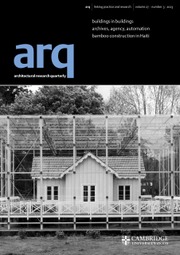No CrossRef data available.
Article contents
Searching for excellence: Ballingdon Bridge
Published online by Cambridge University Press: 06 December 2007
Extract
The act of making links hand and eye, and connects the intellect to physical change. A sculptor carving stone requires precision of thought before deploying manual dexterity. The challenge for an architect until the recent past has been to communicate such thoughtfulness, embodied in a design, to the people who will make the building and its component parts. Making architecture and the pursuit of excellence in the physical delivery of quality in built projects is a challenging and collaborative process [2]. It is not possible to legislate for excellence, however it is possible to create contexts in which high-quality architecture is probable. By comparison, John Ruskin in The Seven Lamps of Architecture (1849) set his aspirations low: ‘We may not be able to command good, or beautiful, or inventive architecture, but we can command an honest architecture’.
- Type
- design
- Information
- Copyright
- Copyright © Cambridge University Press 2007




